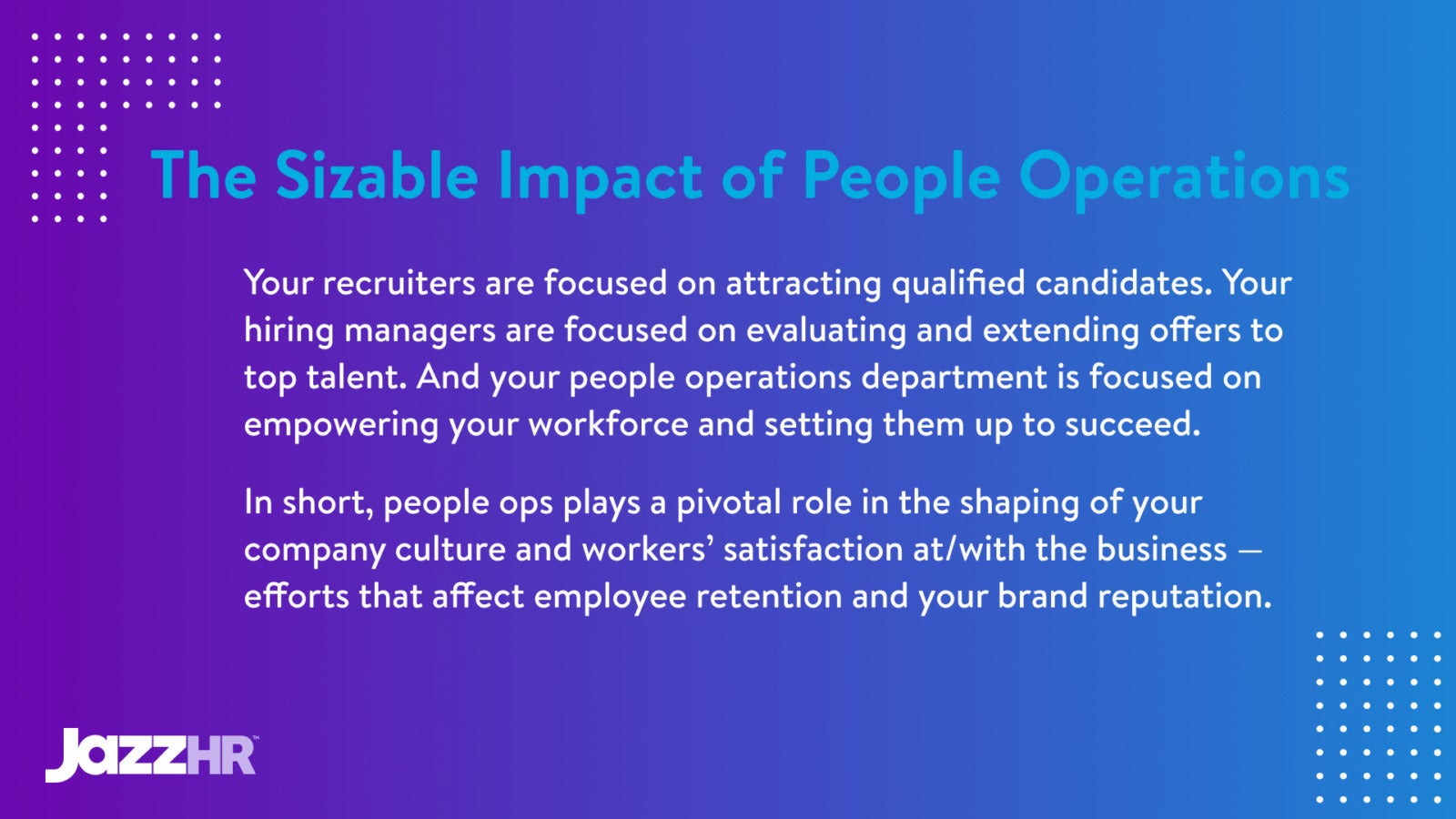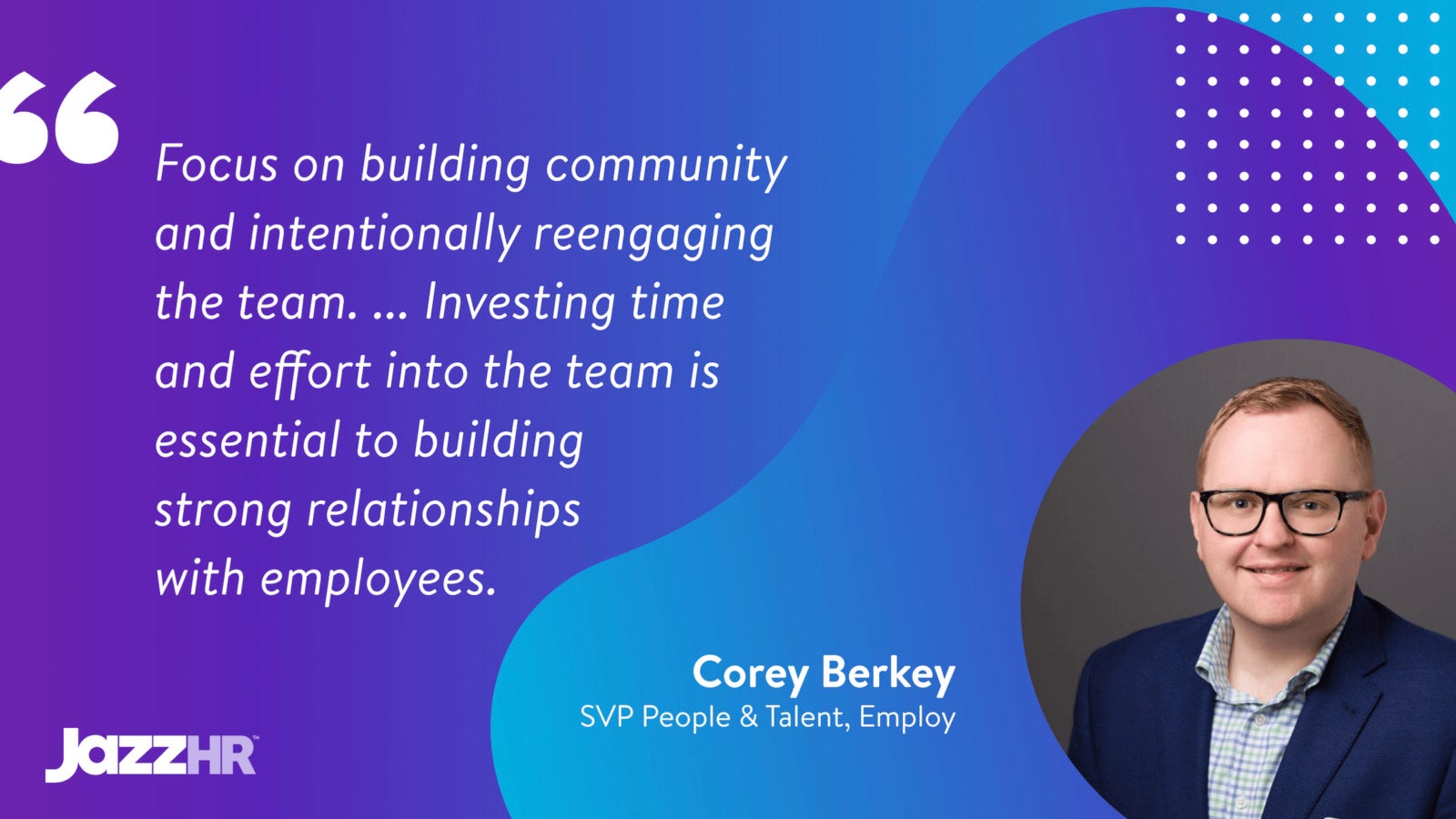The term people operations was first coined by Laszlo Bock, who developed Google’s people ops team, in the book Work Rules!. Bock discusses the similarities between two very different companies.
One of these orgs is a multinational tech conglomerate full of top university graduates (Google). The other business is a large, family-run retailer that typically employs those who don’t finish school.
- What makes them both businesses function and perform well?
The answer is something more than simply offering high-quality products implementing highly structured processes: All their employees are empowered, supported decision-makers.
By prioritizing people operations, both businesses (not just their HR departments and managers, but all organizational leaders) give their teams room to grow into their potential at the business.
The ultimate end goal of any given people operations department is to leverage data and feedback throughout the employee lifecycle to provide a consistently positive employee experience.

What is people operations? A brief explainer
People operations is an approach to workforce management that impacts employees at all levels. The term refers to following a (you guessed it) person-first approach to employment.
- It takes a holistic view of progress, well-being, and results.
Put another way? Everyones role within people operations — analysts, directors, and other specialists — is pretty straightforward: They are responsible for leading, coaching, and overseeing the entire people ops programs designed to elevate the sentiment and prosperity of each employee.
Some define it as human resources combined with operations, while others consider it a simple rebrand of sorts of existing HR responsibilities. (That is, it simply falls under the HR umbrella.)
- The true difference, however, goes well beyond semantics.
Traditional HR manages legalities and policies. These concerns matter, of course, but they are centered on shaping people to fit an organization. The responsibilities of people operations, on the other hand, is a shift in perspective: Designing work to fit around people.
In other words? It’s about moving from a culture of compliance to a culture of autonomy.
How people operations affects your entire SMB
By building work around people, people operations managers and teams take on an additional set of responsibilities that integrate with every part of their org. In short, they are expected to:
- Collaborate with management to track workloads, production, and expectations, especially when interviewing and onboarding new hires.
- Work with internal communications to develop the company culture and employee relationships.
- Offer information on policies and benefits, from rewards and compensation to career planning and training resources.
- Help employees manage transitions, whether into new roles or as part of a wider business change.
- Monitor working conditions, well-being, and turnover rates, checking in regularly to maintain engagement.
- Modernize the business with the use of technology like an applicant tracking system.
- Provide not just metrics, but insights for goal-setting and even strategic decisions at a board level.
- Listen to and advocate for employees, while also aligning their needs with the overall mission of the company.
Simply put, directors of people operations are focused on retention and “human flourishing.” And, as Employ SVP People & Talent Corey Berkey wrote for Forbes, a great tactic to better retain top talent and empower employees to both be their true selves and thrive in their roles is community-building.
“It’s vital to focus on building community and intentionally reengaging the team,” said Corey. “This is challenging when working with hybrid or remote teams. But, investing time and effort into the team is essential to building strong relationships with employees and enhancing the culture and brand.”
- TL;DR: People ops encourage employee development and happiness, so each person becomes an invaluable contributor to the business (and wants to stick around for years to come).
When this vision becomes a reality, everyone at your company can thrive in their respective roles and work well with colleagues on and outside their teams. Equally as important, you end up with a strong culture that becomes the envy of other orgs — and a talent attraction magnet for your recruiters.

Why everyone should care about “people ops”
As you can see, people operations is multi-faceted and far-reaching.
You can tell the value of implementing this approach, because, fundamentally, it is driven by data. Prasad Setty, head of the People Analytics group within Google’s People Operations team, said they wanted to “bring the same level of rigor to the people-decisions that we do to engineering decisions.”
- By using workforce analytics to inform decisions, people operations pros can optimize employee development — a worthwhile endeavor.
When measuring a successful enterprise, evaluators have shifted away from prioritizing tangible assets. Now, human and knowledge capital make up around 70% of the total value of a business.
It’s simple. The more your business leaders care about setting employees up for success and work together to improve workforce satisfaction, the greater said workers’ output and satisfaction will be.






